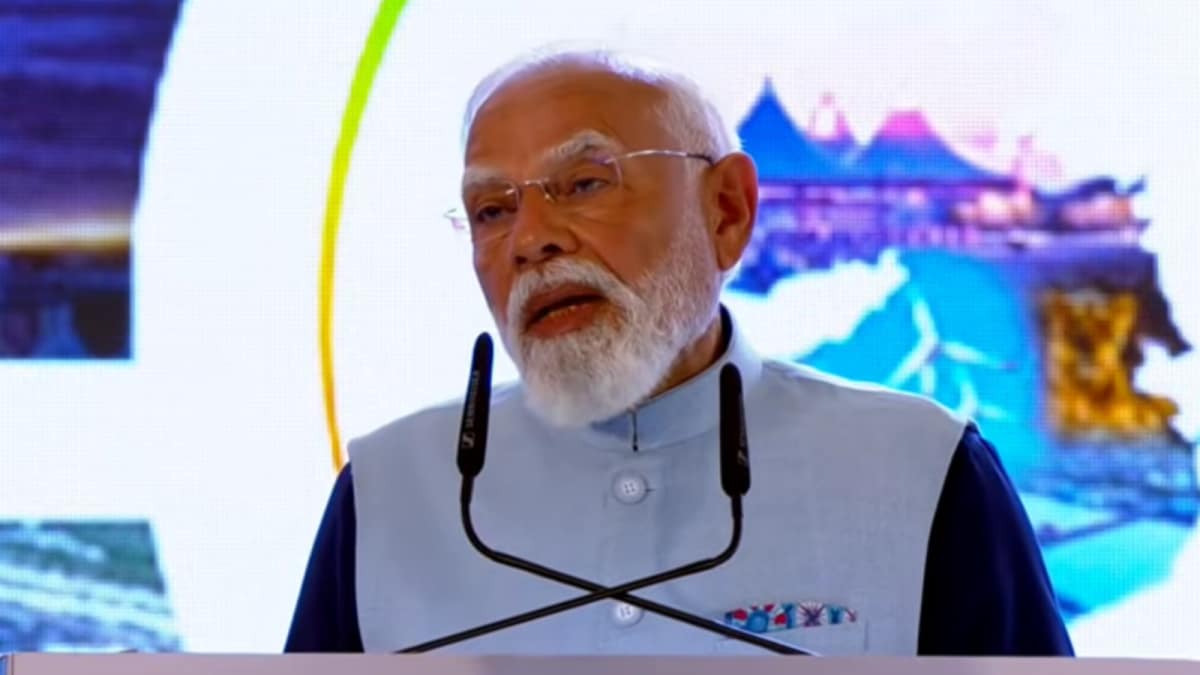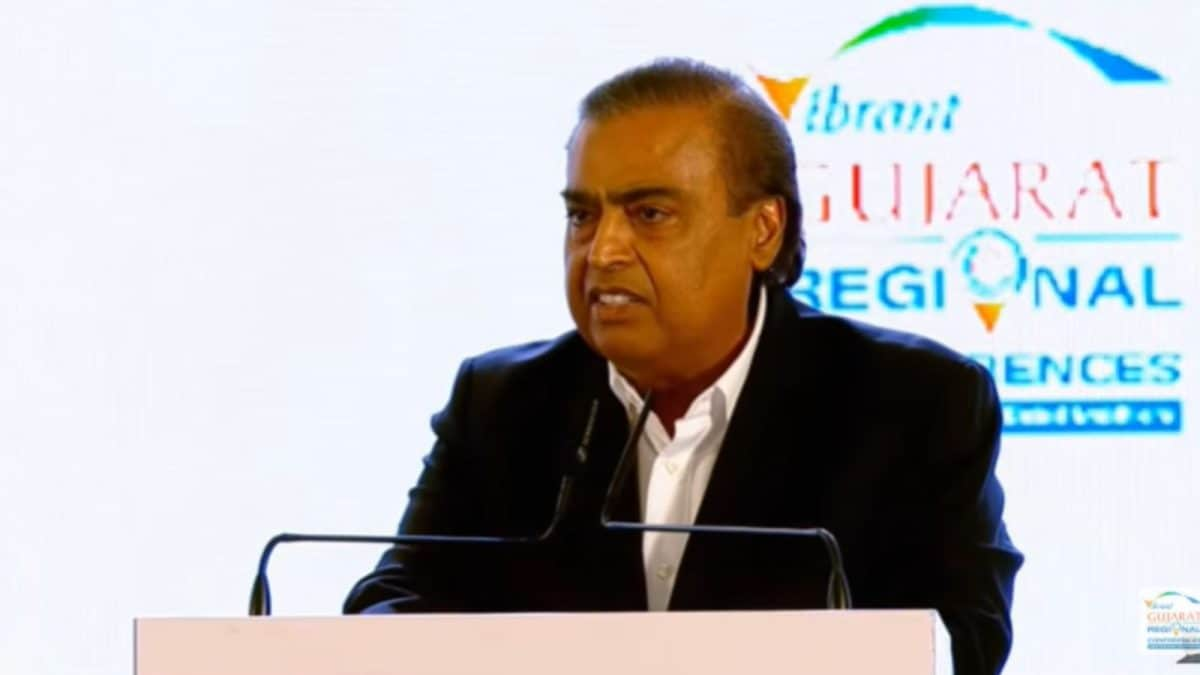Business
India’s Gold Imports Jump 200% To $14.72 Billion In October; Trade Deficit Widens

Last Updated:
India’s exports in October 2025 fall 11.8 per cent to $34.38 billion, while imports jump 16.63 per cent to $76.06 billion.
India’s gold imports in October 2025 jumped to $14.72 billion as against $4.92 billion recorded in the same month last year.
Amid the recent surge in bullion prices globally, India’s gold imports in October 2025 jumped to $14.72 billion as against $4.92 bn recorded in the same month last year, according to the official data released on Monday.
India’s exports in October 2025 fell 11.8 per cent to $34.38 billion, according to the data. Imports jumped 16.63 per cent to $76.06 billion. Imports surged due to increased shipments of gold and silver. The country’s trade deficit stood at $41.68 billion during the month.
The country’s exports to the United States declined to $6.3 bn in October as against $6.9 bn registered in the year-ago month, Commerce Secretary Rajesh Agrawal told reporters here.
During April-October this fiscal, exports increased marginally by 0.63 per cent to $254.25 billion. At the same time, imports rose 6.37 per cent to USD 451.08 billion, the commerce ministry data showed.
India-US Energy Pact
n an effort to boost India’s energy security, Union Petroleum and Natural Gas Minister Hardeep Singh Puri on Monday announced a “historic” deal to import liquefied petroleum gas (LPG) from the US. He said India has been diversifying its LPG sourcing.
According to the minister, Indian PSU oil companies have successfully concluded a one-year deal for imports of around 2.2 million tonnes per annum (MTPA) of LPG from the US Gulf Coast for the contract year 2026.
This represents nearly 10% of India’s annual LPG imports and is the first structured US LPG contract for the Indian market.
“A historic first! One of the largest and the world’s fastest-growing LPG market opens up to the United States. In our endeavour to provide secure affordable supplies of LPG to the people of India, we have been diversifying our LPG sourcing. In a significant development, Indian PSU oil companies have successfully concluded a 1-year deal for imports of around 2.2 MTPA LPG, close to 10% of our annual imports – for the contract year 2026, to be sourced from the US Gulf Coast- the first structured contract of US LPG for the Indian market,” Puri said in a post on X.
(With PTI Inputs)

Haris is Deputy News Editor (Business) at news18.com. He writes on various issues related to personal finance, markets, economy and companies. Having over a decade of experience in financial journalism, Haris h…Read More
Haris is Deputy News Editor (Business) at news18.com. He writes on various issues related to personal finance, markets, economy and companies. Having over a decade of experience in financial journalism, Haris h… Read More
November 17, 2025, 17:38 IST
Read More
Business
‘Side Hustle Generation’: Over 50% Of US Gen Z Opting For Extra Gigs Amid Economic Uncertainty

Last Updated:
At least 57% of Gen Z in the US now have side gigs, from retail to gig work, amid economic uncertainty and concerns over the impact of AI on jobs.

Gen-Z is the first generation for whom a 9-to-5 job isn’t essential for achieving financial success. (AI-Generated Image)
Amid widespread economic uncertainty, more than half of the Gen Z population in the United States is opting for side gigs to navigate the job market and for extra cash.
At least 57% of Gen Z in the US now have side gigs, compared to 21% of boomers and older, according to The Harris Poll, which dubbed them “America’s first true ‘side hustle’ generation.”
Most of them are picking up side hustles, from retail to gig work, for extra cash. Younger people “want to work [and] find success, but many of them just feel disillusioned with the opportunities to get there through the traditional career ladder,” Glassdoor chief economist Daniel Zhao told Axios.
Role Of AI
In an August report, Glassdoor researchers said that some of the youths are chasing creative or entrepreneurial goals. Moreover, AI and other technological advances have made it easier for professionals to monetise their skills and passions.
“We’re witnessing a true side hustle generation where work identity lives outside of traditional employment. Additional commentary and research also shows that there’s a growing number of Employee+ workers who diversify income streams without abandoning job security,” Glassdoor said.
“For Gen Z, the day job funds the passion project. Work pays the bills, but identity and fulfilment can come from entrepreneurial pursuits, creative endeavours, or social causes they care about,” it added.
Why Are Gen-Z Opting For Side Gigs?
One of the main reasons for this shift is job anxiety. Recent graduates are struggling to secure jobs, while those with them aren’t seeing the career growth they expect, according to Zhao.
Data shows that the financial optimism for college students has fallen to their lowest level since 2018, mostly due to concerns over unemployment and ‘AI-induced layoffs’. The advent of AI remains the most pressing concern among young workers.
As per The Harris Poll, Gen Z is the first generation for whom a 9-to-5 job isn’t essential for achieving financial success. Side hustles are not merely distractions or fallback options; they are central to Gen Z’s identity, offering creative, entrepreneurial, or activist outlets that main jobs cannot supply.
“It definitely makes me feel more financially secure,” Katie Arce, who works full-time in e-commerce and picks up shifts at a vintage clothing store in Austin, Texas, told Axios.
United States of America (USA)
January 11, 2026, 17:08 IST
Read More
Business
‘Political Stability Has Powered India’s Growth’: PM Modi At Vibrant Gujarat Conference

Last Updated:
PM Modi further emphasised that over the past 11 years, India has emerged as the largest data consumer and built the country’s largest real-time digital platform.

PM Modi speaking at the inauguration of Vibrant Gujarat Regional Conference. (PTI)
Prime Minister Narendra Modi on Sunday said that India’s political stability and strong macroeconomic fundamentals are driving global investor confidence, with Gujarat emerging as a key anchor of the country’s growth story.
While addressing the Vibrant Gujarat Regional Conference in Gujarat, the Prime Minister highlighted India’s economic trajectory, saying that the country is the world’s fastest-growing major economy, with inflation under control and a strong foundation for long-term growth. He said that reform express is driving India’s journey to developed nation status.
He highlighted that India is the largest producer of milk and a leading manufacturer of generic medicines, reflecting the country’s growing strength in both agriculture and pharmaceuticals.
VIDEO | Rajkot: PM Modi (@narendramodi) says, “India is the world’s fastest-growing large economy and inflation is under control. Agricultural production in India is setting new records, and the country ranks number one in milk production. India is also the world’s largest… pic.twitter.com/R6f7tDhoZD— Press Trust of India (@PTI_News) January 11, 2026
He noted that global institutions are increasingly bullish on India, with the International Monetary Fund (IMF) describing the country as the engine of global growth.
“India is the world’s 3rd largest startup ecosystem, 3rd largest aviation market, we are in the top 3 metro networks of the world,” he said, asserting that the country is heading to become the world’s 3rd largest economy.
PM Modi further emphasised that over the past 11 years, India has emerged as the largest data consumer and built the country’s largest real-time digital platform. He highlighted that India is now the second-largest mobile manufacturer, whereas earlier the country imported nine out of ten phones.
The Prime Minister also underlined Gujarat’s contribution to India becoming the world’s third-largest economy, noting that the state has grown across sectors. He said regions like Saurashtra and Kutch, once seen as remote, have now become major drivers of Atmanirbhar Bharat and investment-led growth.
Highlighting Saurashtra’s manufacturing strength, with over 2.5 lakh MSMEs producing goods ranging from basic tools to high-precision aircraft components, PM Modi pointed to the region hosting the world’s largest ship-breaking yard and being a major hub for tile manufacturing.
He further said that India’s first semiconductor fabrication plant is coming up in Dholera, with the land ready and a predictable policy environment supporting long-term growth.
Vibrant Gujarat Regional Conference
PM Modi on Sunday inaugurated the Vibrant Gujarat Regional Conference for the Kutch and Saurashtra regions.
The event saw the presence of Gujarat Chief Minister Bhupendra Patel and Deputy Chief Minister Harsh Sanghavi, among other dignitaries.
He also inaugurated 13 New Smart Industrial Estates in 7 Districts (Amreli, Bhavnagar, Jamnagar, Kutch, Morbi, Rajkot and Surendranagar) spanning an area of over 3540 Acres by Gujarat Industrial Development Corporation before his address on Sunday.
The two-day conference summit will highlight Gujarat’s leadership in the clean energy sector and its alignment with India’s ‘Panchamrit’ commitments announced by the Prime Minister. These include achieving 500 GW of non-fossil energy capacity by 2030, meeting 50 per cent of energy requirements from renewable sources, reducing projected carbon emissions by 1 billion tonnes, lowering carbon intensity by 45 per cent by 2030, and attaining net-zero emissions by 2070.
Rajkot, India, India
January 11, 2026, 16:22 IST
Read More
Business
‘You’ve Restored India’s Civilisational Self-Belief’: Mukesh Ambani Praises PM Modi At Vibrant Gujarat

Last Updated:
Reliance Industries chairman and managing director Mukesh Ambani said PM Narendra Modi’s vision has reshaped India’s trajectory for the next 50 years

Reliance Industries chairman and managing director speaks at the Vibrant Gujarat Regional Conferences on January 11, 2025. (Image: Vibrant Gujarat/YouTube)
Reliance Industries chairman and managing director Mukesh Ambani had high praise for Prime Minister Narendra Modi, who inaugurated the Vibrant Gujarat Regional Conference for the Kutch and Saurashtra regions on Sunday.
Ambani said Modi’s vision has reshaped India’s trajectory for the next 50 years, while also restoring the country’s “civilisational self-belief”.
“Most respected prime minister, you have restored to India its civilisational self-belief. Never in history of India have we seen so much hope, self confidence, and so much vibrancy as we do now,” Ambani said during his address at the conference.
Congratulating Modi for the “great honour for Saurashtra and Kutch” that he was personally present, he started his address by referring to the prime minister’s visit to Somnath temple for the ‘Somnath Swabhiman Parv’ earlier in the day.
“Let me start with ‘Jai Somnath’. The positive vibrations from our dear prime minister’s prayers from Somnath are resonating across Gujarat and India. I congratulate our PM for the great honour for Saurashtra and Kutch that he is personally present for the Vibrant Gujarat regional summit (conference). After 20 years in Gandhinagar, we are privileged to take part in the regional summit here in Rajkot,” he said.
Ambani said history will record the “Modi era” as when India moved from “potential to performance, aspiration to action, follower to becoming a global force”.
“Your (Modi’s) vision has reshaped India’s trajectory for the next 50 years and more. History will record that the Modi era is when India moved from potential to performance, from aspiration to action, from being a follower to becoming a global force,” he said.
Calling Modi the “invincible, protective wall” of India, he said the PM is the reason why global challenges cannot “touch or trouble” the country.
“All of us know that the world is changing very fast, the geopolitical situation is creating new challenges including some unexpected turbulence but what is reassuring for India is that these challenges can’t touch or trouble our people. This is because India has the invincible, protective wall called Narendrabhai Modi. Let the world know that this is India’s defining decade, under the PM’s leadership, India’s not just preparing for the future but India’s shaping it,” he added.
Modi inaugurated the event in the presence of Gujarat Chief Minister Bhupendra Patel and deputy CM Harsh Sanghavi, among other dignitaries. The two-day conference will highlight Gujarat’s leadership in the clean energy sector and its alignment with India’s ‘Panchamrit’ commitments announced by the PM.
These include achieving 500 GW of non-fossil energy capacity by 2030, meeting 50 per cent of energy requirements from renewable sources, reducing projected carbon emissions by 1 billion tonnes, lowering carbon intensity by 45 per cent by 2030, and attaining net-zero emissions by 2070.
(With agency inputs)
Rajkot, India, India
January 11, 2026, 15:43 IST
Read More
-

 Sports6 days ago
Sports6 days agoVAR review: Why was Wirtz onside in Premier League, offside in Europe?
-

 Entertainment4 days ago
Entertainment4 days agoDoes new US food pyramid put too much steak on your plate?
-

 Politics4 days ago
Politics4 days agoUK says provided assistance in US-led tanker seizure
-

 Entertainment4 days ago
Entertainment4 days agoWhy did Nick Reiner’s lawyer Alan Jackson withdraw from case?
-

 Sports6 days ago
Sports6 days agoSteelers escape Ravens’ late push, win AFC North title
-

 Politics6 days ago
Politics6 days agoChina’s birth-rate push sputters as couples stay child-free
-

 Entertainment6 days ago
Entertainment6 days agoMinnesota Governor Tim Walz to drop out of 2026 race, official confirmation expected soon
-

 Sports7 days ago
Sports7 days agoFACI invites applications for 2026 chess development project | The Express Tribune






